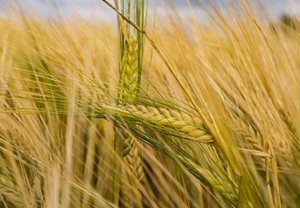As part of the government’s Net Zero Strategy set out in October 2021, it ‘aims to restore the UK countryside to reduce emissions, sequester carbon and build resilience to climate change.’ It was the line, ‘Tree planting will increase to sequester carbon and peatlands will be restored’ which caused alarm for many farmers.
 This fuelled a debate on the role and the importance of the farmer in our economy. Would planting more trees make us more dependent on importing food through trade deals with other countries? The war in Ukraine has further intensified discussion on our food supply chain. The reality that the UK is just above 60% self-sufficient in food has been a wake-up call to some.
This fuelled a debate on the role and the importance of the farmer in our economy. Would planting more trees make us more dependent on importing food through trade deals with other countries? The war in Ukraine has further intensified discussion on our food supply chain. The reality that the UK is just above 60% self-sufficient in food has been a wake-up call to some.
Impact of Russia’s war
Ukraine is still very much the breadbasket of Europe, and the war will have a major impact on the cost of our groceries, including our bread. For millions of Ukrainians, the cost goes far beyond the price of food. Homes have either been abandoned or destroyed, with families having lost loved ones, or been separated, causing them untold suffering in a mounting crisis that is becoming the biggest European refugee emergency since 1945.
In many of the Old Testament Bible stories people moved from one country to another and became refugees, often because of famine. There is the story of Abraham and Sarah who left their home to go to Egypt. Jacob and his family also left their home and went to Egypt. Elimelech and Naomi with their sons left Bethlehem and went to the land of Moab. In each case they moved because of the shortage of food.
The name Bethlehem means, ‘house of bread’ because it was a ‘breadbasket’ providing bread for people in Israel. This ‘house of bread’ became the birthplace of the Saviour Jesus, bringing together both the physical and spiritual bread. In Mathew 4:4, in answer to a question, Jesus says, “It is written: ‘Man shall not live on bread alone, but on every word that comes from the mouth of God.”
Our physical & spiritual needs
God knows that we need physical food. He demonstrated that through the feeding of the Children of Israel with Manna in the desert for 40 years (Exodus 13-16 & 31). He demonstrated that through Jesus feeding 5,000 people (Mark 6: 30-44) and the crowd of 4,000 (Mark 8:1-10). We so often forget that God still provides food for the world each day. Jesus taught us to recognise this by praying to God in Matthew 6:11 ‘give us this day our daily bread’.
God provides physical food, and in John 6:35 demonstrated that He also provides spiritual food when Jesus declared, “I am the bread of life. Whoever comes to me will never go hungry, and whoever believes in me will never be thirsty.”
Terrible and painful as a shortage of bread is for our human bodies, the most tragic famine is described in Amos 8:11 - a famine of hearing the word of God. Today, can I encourage you to read and listen to the word of God that it may be your spiritual breadbasket from which you will be nourished? Can I also urge you to believe that Jesus Christ is the ‘bread of life’, trusting that you will place your faith in Him as your Lord and as your Saviour - and as you feed upon His word, may it be well with your soul for now and eternity.
 Trevor Boyd is the minister of Draperstown and Tobermore Presbyterian Churches in the shadow of the Sperrin Mountains in County Londonderry. Married to Barbara, the father of three is a sheep breeder and previously sold animal health products across Northern Ireland.
Trevor Boyd is the minister of Draperstown and Tobermore Presbyterian Churches in the shadow of the Sperrin Mountains in County Londonderry. Married to Barbara, the father of three is a sheep breeder and previously sold animal health products across Northern Ireland.
His blog appeared in a fortnightly column entitled ‘Good News For the Countryside’, in today’s Farming Life, where people from a farming background, or who have a heart for the countryside, offer a personal reflection on faith and rural life.
You can look at other blogs in this series here.
If you would like to talk to someone about any of the issues raised in this article, please email Rev Kenny Hanna, PCI’s Rural Chaplain at ruralchaplain@presbyterianireland.org or call him on 07938 488 372.